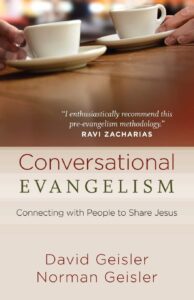What is Conversational Evangelism?
Co-authored by Dr. Norman Geisler and his son Dr. David Geisler, Conversational Evangelism teaches a practical application of “light” apologetics within evangelism. This method shows how to remove barriers and come alongside non-believers to help them build a bridge to the gospel, in ways that are personally and culturally sensitive.
Have you ever wished there were a way to help non-believers want to continue conversations about Christ?
What if you could find tools that would help you be sensitive to their felt needs, both personally and culturally?
What if evangelism didn’t have to be uncomfortable or make you come across as offensive?
What if there were a way to come alongside someone and walk with them from the point of their interest, to the foot of the Cross… while building a discipleship relationship?
Join Dr. David Geisler in this FREE, three-part training to learn how God can work through you to help non-believers surface the Truth for themselves!
This integration of apologetics in evangelism asks us to radically shift our view: from the responsibility to passively be “ready to give an answer to anyone who asks,” (1 Peter 3:15), to actively cultivating “good soil” (Matthew 3:23) in every conversation!
Excerpt from Conversational Evangelism, by David Geisler and Norm Geisler:
“Some people have the mistaken notion that this [1 Peter 3:15] means we only respond to questions asked by the nonbeliever. “Being ready,” however, means more than just waiting for someone to ask us a question. The word for “being ready” in the Greek (hetoimos) is the same word used to refer to our anticipating (“being ready for”) Christ’s return (Matthew 24:44; Luke 12:40). So in 1 Peter 3:15, “being ready” means to anticipate nonbelievers’ questions or objections.
If we combine 1 Peter 3:15 with 2 Corinthians 10:5 and 1 Corinthians 9:22, it is clear that our responsibility as Christians is to eagerly anticipate the questions and objections our nonbelieving friends may raise. “Being ready is not just a matter of having the right information available, it is an attitude of readiness and eagerness to share the truth of what we believe” (Geisler, Baker Encyclopedia of Christian Apologists, 37). Furthermore, we must be ready to give adequate answers to troubling questions, whether we are asked a specific question or not. This was the apostle Paul’s practice in Acts 17 in speaking to the polytheists. He did not wait for them to raise objections or concerns; he took the offensive and pointed out the discrepancies in their beliefs (Acts 17:23-29).
This clarification about what it means to “be ready” has major implications. If it truly is our responsibility to help our nonbelieving friends take one step closer to Jesus every day, as 1 Corinthians 3:6 and 1 Corinthians 9:22 imply, and if it is legitimate to practice the apologetic task by removing any potential barriers to faith in Christ, whether expressed or not, then this will cause a radical shift in how we do evangelism. In every encounter with our friends, we will try to discern what are the major obstacles keeping them from trusting Christ. In every conversation, we will look for opportunities to build bridges by asking thought-provoking questions that potentially could move our conversation in a spiritual direction. Each moment we speak with our nonbelieving friends we will try to anticipate and remove obstacles they may encounter in their journey to the cross. All of this will be seen not as something supplemental, but as something fundamental to our responsibility to be a disciple of Jesus Christ in the world.
If 1 Peter 3:15 implies that one of the ways we make Christ Lord in our life (“sanctify Christ as Lord” NASB) is by giving an answer, and if it is clear that giving an answer means not only giving answers to stated concerns but also anticipating obstacles that may affect someone’s spiritual journey, then how can we truly make Christ Lord in our lives if we are not looking for opportunities each day to help our nonbelieving friends take one step closer to Jesus?
May God help us to understand, like the men of Issachar, the times in which we live (1 Chronicles 12:32) and therefore know what we should do.”
Part 1: Paradigm Shift
Why is evangelism in general more difficult today than it was even 50 years ago? What has changed, and how do we need to pivot to adapt our techniques for this generation?
Part 2: Building New Paradigms
How can we co-journey with non-believers step by step to the Cross? What techniques can we use to identify the barriers that are on the surface, and the ones that are hidden? How can we be a better witness in our daily life?
Part 3: 10 Things to Keep in Mind in Witnessing to a Skeptic
Skeptics question everything they hear, and often deny that we can know anything at all! So how can we help them surface the truth for themselves, in ways that are both personally and culturally sensitive?
Interested in diving deeper into this training through a workshop? NGIM now offers both a self-paced and mentor-led workshop through the Norm Geisler Institute!
If you would like to host this training for your church, mission, or nonprofit, contact us at info@ngim.org

